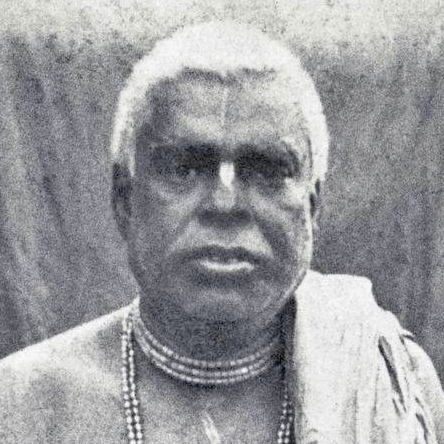Continuing our presentation of the recent release Sharanagati, in this song Srila Bhakti Vinod Thakur describes how a surrendered soul prayeys to honour the Vaishanvas.
Sharanagati
Song Thirty-eight
hari he!
saṅga-doṣa-śūnya, dīkṣitādīkṣita,
yadi tava nāma gā’ya
mānase ādara, kariba tā̐hāre
jāni’ nija-jana tāya [1]
hari–Lord; he!–oh!; saṅga–association; doṣa (asat)–faulty (bad); śūnya (mukta)–free from; dīkṣita (śrī guru-padāśrita)–initiated (sheltered at the feet of Śrī Guru); adīkṣita (tat-pūrvāvasthā prāpta)–not initiated (situated in the preliminary stage prior to taking shelter of Śrī Guru); yadi–if; tava–Your; nāma–Name; gā’ya–sings; mānase–within my heart; ādara (tā̐hāra hṛdgata bhāvera prati samāna)–honour (for their heartfelt faith and devotion); kariba–I will do; tā̐hāre–of them; jāni’–knowing; nija–own; jana–person; tāya–them. [1]
(1) O Lord! If one free from bad association, be they initiated or yet to be initiated, sings Your Name, I will honour them within my heart, knowing them to be Yours.
dīkṣita ha-iyā, bhaje tuyā pada,
tā̐hāre praṇati kari
ananya-bhajane, vijña yei jana
tā̐hāre seviba hari! [2]
dīkṣita–initiated; ha-iyā–being; bhaje–serves; tuyā–Your; pada–feet; tā̐hāre (sad-guru padāśraye prakāśita bhakti-chihṇa bhaktake)–to them (to a devotee who exhibits symptoms of devotion while sheltered at the feet of a true Guru); praṇati (prakāśita maryādā dāna kariyā)–bow (offering honour); kari (kariba)–I do (I will do); ananya (aikāntika)–unalloyed (sincere, wholehearted); bhajane (bhajanaśīlera)–in devotional service (of devotional practice); vijña–expert; yei–who; jana–person; tā̐hāre–their; seviba (sevā kariba)–I will serve; hari!–O Lord! [2]
(2) I will offer my obeisance to anyone who has been initiated and serves Your feet. I will serve anyone who is expert in unalloyed devotional service, O Lord!
sarva-bhūte sama, ye bhaktera mati
tā̐hāra darśane māni
āpanāke dhanya, se saṅga pāiyā
charitārtha ha-ilu̐ jāni [3]
sarva–all; bhūte–to living entities; sama–equal; ye–who; bhaktera–of a devotee; mati–disposition; tā̐hāra (samudaya vastute kṛṣṇa sambandha-darśī bhaktake)–their (a devotee who sees the presence or connection of Kṛṣṇa within all things); darśane–in the sight; māni–I consider; āpanāke–to myself; dhanya–fortunate; se–their; saṅga–association; pāiyā–obtaining; charitārtha (kṛtārtha)–fulfilled; ha-ilu̐–I have become; jāni–I know. [3]
(3) I consider myself fortunate to obtain the merciful glance of a devotee who is equally disposed towards all beings (who sees Your presence within everything). Obtaining their association, I know myself to have become fulfilled.
niṣkapaṭa-mati, vaiṣṇavera prati
ei dharma kabe pā’ba
kabe e saṁsāra- sindhu-pāra ha’ye,
tava vraja-pure yā’ba [4]
niṣkapaṭa (akṛtrima-bhāve)–non-deceitful (in a non-artificial, sincere way); mati–disposition; vaiṣṇavera–of devotees; prati–towards; ei–this; dharma–nature; kabe–when?; pā’ba–I will obtain; kabe–when?; e–this; saṁsāra–of material existence; sindhu–the ocean; pāra–to the farther shore; ha’ye–being; tava–Your; vraja–known as ‘Vraja’; pure–to the village; yā’ba–I will go. [4]
(4) When will I obtain this sincere disposition towards Your devotees? When will I cross over this ocean of material existence and enter Your abode of Vraja?
(1–4) This song is based on the fifth verse of Sri Upadeshamrita by Srila Rupa Goswami Prabhu:
kṛṣṇeti yasya giri taṁ manasādriyeta
dīkṣāsti chet praṇatibhiś cha bhajantam īśam
śuśrūṣayā bhajana-vijñam ananyam anya-
nindādi-śūnya-hṛdam īpsita-saṅga-labdhyā
“One who chants Krishna’s Name (the kanishtha-adhikari) should be honoured within the heart. One who is initiated and engaged in the Lord’s service (the madhyam-adhikari) should be honoured with obeisance. One who is expert in devotion, who sees nothing apart from Krishna, and whose heart is free from the duality of criticising and praising others (the uttam-adhikari), should be considered most desirable association and honoured through submissive service.”



Leave a Reply